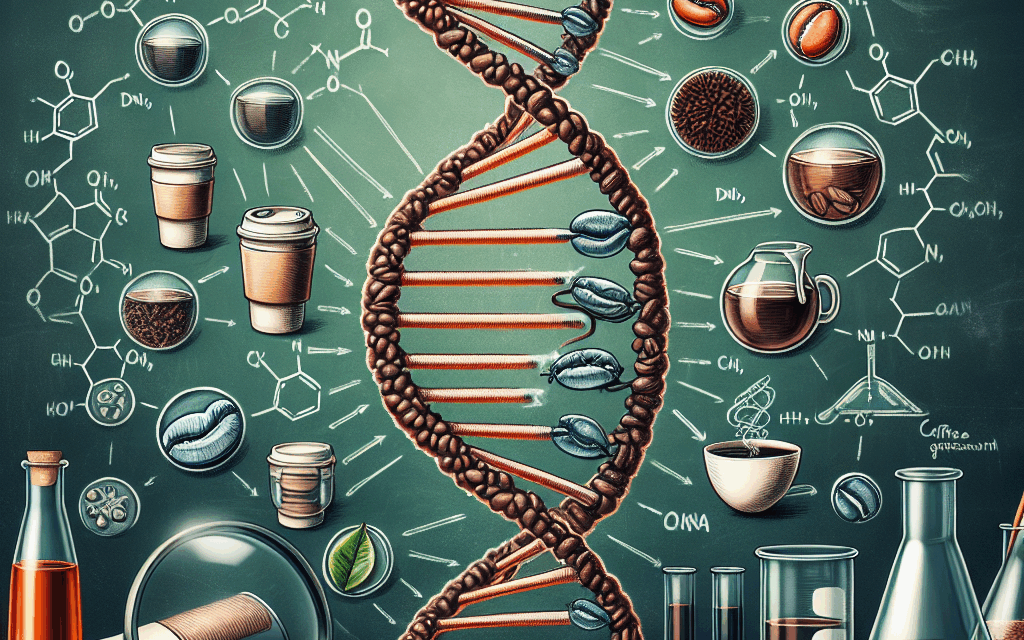Unraveling Your DNA: The Science Behind Your Caffeine Connection
Caffeine is one of the most widely consumed psychoactive substances in the world, found in coffee, tea, energy drinks, and various foods. While many people enjoy caffeine for its stimulating effects, the way individuals metabolize and respond to caffeine can vary significantly. This variability is largely influenced by genetics. In this article, we will explore the intricate relationship between your DNA and your caffeine consumption, delving into the science behind caffeine metabolism, genetic variations, and how these factors can affect your daily life.
The Biochemistry of Caffeine
Caffeine is a central nervous system stimulant that temporarily wards off drowsiness and restores alertness. It works primarily by blocking the action of adenosine, a neurotransmitter that promotes sleep and relaxation. When adenosine is blocked, the levels of other neurotransmitters, such as dopamine and norepinephrine, increase, leading to heightened alertness and improved mood.
Once consumed, caffeine is rapidly absorbed into the bloodstream and distributed throughout the body. The liver plays a crucial role in metabolizing caffeine, primarily through the action of enzymes known as cytochrome P450 enzymes, particularly CYP1A2. This metabolic process converts caffeine into three primary metabolites: paraxanthine, theobromine, and theophylline, each of which has its own physiological effects.
- Paraxanthine: Increases lipolysis, the breakdown of fats, which can enhance physical performance.
- Theobromine: Has a mild diuretic effect and can improve blood flow.
- Theophylline: Acts as a bronchodilator, which can help with respiratory issues.
The rate at which caffeine is metabolized can vary significantly among individuals, leading to differences in how caffeine affects them. This variability is largely due to genetic factors, which we will explore in the following sections.
Genetic Variations in Caffeine Metabolism
Genetic variations play a significant role in how individuals metabolize caffeine. The most studied genetic variant related to caffeine metabolism is found in the CYP1A2 gene. This gene encodes the enzyme responsible for breaking down caffeine in the liver. Variations in this gene can lead to different metabolic rates, categorizing individuals as either “fast” or “slow” metabolizers of caffeine.
Research has identified several single nucleotide polymorphisms (SNPs) in the CYP1A2 gene that influence caffeine metabolism. The most notable SNP is rs762551, which has been associated with increased enzyme activity. Individuals with the “C” allele of this SNP tend to metabolize caffeine more quickly than those with the “A” allele, who are considered slow metabolizers.
Fast metabolizers can consume higher amounts of caffeine without experiencing adverse effects, while slow metabolizers may be more sensitive to caffeine’s effects, experiencing increased heart rate, anxiety, or sleep disturbances even at lower doses. This genetic predisposition can influence not only caffeine consumption habits but also health outcomes related to caffeine intake.
- Fast Metabolizers: Generally tolerate higher caffeine intake; may benefit from increased alertness and improved cognitive performance.
- Slow Metabolizers: More prone to negative side effects; may need to limit caffeine intake to avoid anxiety and sleep disturbances.
Understanding these genetic differences can help individuals make informed choices about their caffeine consumption. For instance, a slow metabolizer may choose to limit their coffee intake to avoid jitters, while a fast metabolizer may enjoy multiple cups without issue.
The Role of Other Genes in Caffeine Sensitivity
While the CYP1A2 gene is the most well-known in relation to caffeine metabolism, other genes also play a role in how individuals respond to caffeine. For example, the ADORA2A gene encodes the adenosine A2A receptor, which is involved in the effects of caffeine on the brain. Variations in this gene can influence an individual’s sensitivity to caffeine’s stimulant effects.
Research has shown that certain variants of the ADORA2A gene can lead to increased sensitivity to caffeine, resulting in heightened anxiety and sleep disturbances. Individuals with these variants may experience more pronounced effects from caffeine, even at lower doses. This can be particularly relevant for those who consume caffeine for its cognitive-enhancing effects, as increased sensitivity may lead to diminished returns.
Another gene of interest is the COMT gene, which is involved in the metabolism of dopamine, a neurotransmitter that plays a key role in mood and cognition. Variations in the COMT gene can affect how caffeine influences dopamine levels, potentially impacting mood and cognitive performance.
- ADORA2A Variants: Can lead to increased sensitivity to caffeine; may experience anxiety and sleep disturbances.
- COMT Variants: Influence dopamine metabolism; can affect mood and cognitive performance in response to caffeine.
These genetic factors highlight the complexity of caffeine’s effects on individuals and underscore the importance of personalized approaches to caffeine consumption. Understanding one’s genetic predisposition can help tailor caffeine intake to optimize its benefits while minimizing adverse effects.
Caffeine and Health: The Genetic Connection
The relationship between caffeine consumption and health outcomes is a topic of ongoing research. Studies have shown that genetic variations can influence not only how individuals metabolize caffeine but also how caffeine affects their health. For instance, some research suggests that fast metabolizers may have a lower risk of certain diseases associated with caffeine consumption, while slow metabolizers may face increased risks.
One area of interest is the relationship between caffeine and cardiovascular health. Some studies have indicated that fast metabolizers may experience protective effects against cardiovascular disease, while slow metabolizers may be at higher risk for hypertension and other cardiovascular issues. This is thought to be due to the way caffeine affects blood pressure and heart rate, with slow metabolizers experiencing more pronounced effects.
Additionally, caffeine has been linked to various health outcomes, including type 2 diabetes, liver health, and even certain types of cancer. Research has shown that individuals with specific genetic variants may experience different effects from caffeine in these contexts. For example, some studies suggest that caffeine consumption may be associated with a lower risk of developing type 2 diabetes, particularly in fast metabolizers.
- Cardiovascular Health: Fast metabolizers may have protective effects; slow metabolizers may face increased risks.
- Type 2 Diabetes: Caffeine consumption may lower risk, especially in fast metabolizers.
- Liver Health: Caffeine may have protective effects against liver disease.
- Cancer Risk: Some studies suggest a potential link between caffeine and reduced risk of certain cancers.
These findings underscore the importance of considering genetic factors when evaluating the health effects of caffeine. Personalized approaches to caffeine consumption can help individuals make informed choices that align with their genetic predispositions and health goals.
Practical Implications: Tailoring Your Caffeine Intake
Understanding the genetic factors that influence caffeine metabolism and sensitivity can have practical implications for individuals looking to optimize their caffeine intake. Here are some strategies to consider based on genetic predispositions:
- Know Your Genetics: Consider genetic testing to determine your caffeine metabolism type. This information can guide your caffeine consumption habits.
- Monitor Your Response: Pay attention to how your body responds to caffeine. If you experience anxiety, jitters, or sleep disturbances, you may be a slow metabolizer and should consider reducing your intake.
- Choose Your Sources Wisely: Different sources of caffeine can have varying effects. For example, coffee contains antioxidants and other beneficial compounds, while energy drinks may contain high levels of sugar and other stimulants.
- Timing Matters: Consider the timing of your caffeine consumption. For slow metabolizers, consuming caffeine earlier in the day may help avoid sleep disturbances.
- Stay Informed: Keep up with the latest research on caffeine and health. New findings may provide insights into how to optimize your caffeine intake based on your genetic profile.
By tailoring your caffeine consumption to your genetic predispositions, you can maximize the benefits of caffeine while minimizing potential adverse effects. This personalized approach can lead to improved cognitive performance, better mood regulation, and overall enhanced well-being.
Conclusion
The relationship between genetics and caffeine metabolism is a fascinating area of research that has significant implications for individuals seeking to optimize their caffeine consumption. Understanding the role of genetic variations, particularly in the CYP1A2, ADORA2A, and COMT genes, can help individuals make informed choices about their caffeine intake.
As we have explored, genetic factors can influence not only how quickly caffeine is metabolized but also how it affects mood, cognition, and overall health. Fast metabolizers may enjoy the benefits of caffeine without adverse effects, while slow metabolizers may need to exercise caution to avoid negative side effects.
By considering these genetic factors and tailoring caffeine consumption accordingly, individuals can enhance their daily lives, improve cognitive performance, and promote better health outcomes. As research continues to evolve, the potential for personalized approaches to caffeine consumption will only grow, paving the way for a deeper understanding of how our DNA shapes our relationship with this ubiquitous stimulant.





